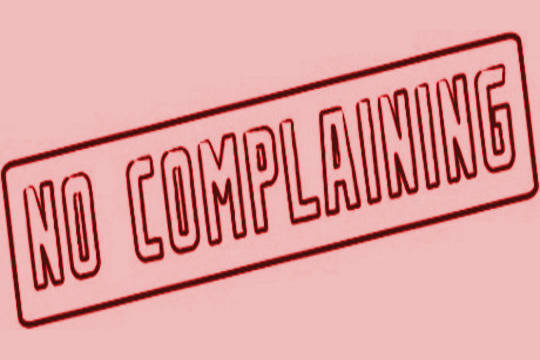Some of us frequently find ourselves indulging in our "favorite" pastime: complaining. It's not exactly our favorite activity, because it makes us more miserable, but it's certainly one that we engage in often. We don't always see what we're doing as complaining; in fact, we often think we're simply telling the truth about the world. But when we look carefully, we are forced to acknowledge that our woebegone statements are actually complaints.
What constitutes complaining? One dictionary defines it as, "An expression of pain, dissatisfaction, or resentment." I would add that it's a statement of dislike, blame, or judgment that we whine about repeatedly.
Contents of Complaints
We complain about anything and everything. "My flight has been cancelled." "The insurance company refused to hear my claim." "It's too hot." "My friend is in a bad mood."
We complain about our wealth, or lack of it. No matter how much one possesses, no one ever feels that it is enough. We grumble that it's not fair that others have more money than we do and that they have better opportunities to earn it.
We complain about our health. This is not limited to the ill and elderly. "My back hurts." "My allergies are acting up." "I have a headache." "My cholesterol is too high." "I'm exhausted." "My heart beats irregularly." "My kidneys don't work right." "My little toe is infected."
We can talk about our own aches and pains without tiring of the topic, although we find listening to others do the same boring.
One of the juiciest topics of complaint is others' actions and personalities. We resemble mental gossip columnists. "My colleague at work doesn't turn in his work on time." "My boss is too bossy." "My employees are ungrateful." "After everything I did for my kids, they moved to another town, and they don't come home for holidays." "I'm fifty, and my parents are still trying to run my life." "This person talks too loud."
Complaining about political leaders and the government -- not just our own, but others' too -- is a national pastime in the USA. We bemoan unfair policies, the brutality of oppressive regimes, the injustice of the justice system, and the cruelty of the global economy. We write e-mails to friends who have the same political views as we do and hope they will do something to change the situation.
In essence, we complain about whatever meets with our disapproval.
Why Do We Complain?
We complain for a variety of reasons. In all the cases, we're looking for something, even though we may not be aware of what it is at the time.
Sometimes we complain because we simply want someone to recognize our suffering. Once they do, something inside us feels satisfied, but until they do, we go on and on telling our story. For example, we may tell the story of a dear one betraying our trust. When our friends try to fix the problem, we feel more frustrated. We may even feel that they're not hearing us. But when they say, "You must be very disappointed," we feel heard -- our misery has been acknowledged -- and we say no more.
At other times, we continue to lament despite others' understanding. For example, we may repeatedly complain about our health out of self-pity or the wish to gain others' sympathy. Others may be sympathetic, but no matter what they say or do for us, we are dissatisfied.
We may complain in the hopes that someone will fix our problem. Instead of asking someone directly for help, we recount our sad story again and again in the hopes that someone will get the message and change the situation for us. We may do this because we're too lazy or frightened to try to solve the problem ourselves. For instance, we complain to a colleague about a disturbing situation at work in the hopes that she will go to the manager about it.
We complain to vent our emotions and our feelings of powerlessness. We criticize government policies, the corruption of CEOs, and the activities of politicians that prevent them from actually caring for the country. We dislike these things, but we feel powerless to change them, so we preside over what amounts to a court case -- either mentally or with our friends -- in which we prosecute, convict, and banish the people involved.
"Venting" is often used to justify ranting about whatever we want. One friend told me that he regularly hears people say, "I have to vent! I'm so angry, I just can't help it." Such people seem to feel that they will explode if they don't let off some steam. However, shouldn't we take into account the consequences, for ourselves and others, of venting? In the Buddha's teachings we find many other options to resolve our frustration and anger without spewing them out on others.
Discussing vs. Complaining
What is the difference between complaining and discussing certain topics in a constructive way? Here, our attitude or our motivation for speaking is chief. Discussing a situation involves taking a more balanced approach, in which we actively try to understand the origin of the problem and consider various possible remedies. We are proactive, not reactive. We assume responsibility for what is our responsibility and cease blaming others when we cannot control a situation.
Thus, it's possible to discuss our health without complaining about it. We simply tell others the facts and go on. If we need help, we ask for it directly, instead of lamenting in the hopes that someone will rescue us or feel sorry for us.
Similarly, we can discuss our financial situation, a friendship gone awry, an unfair policy at work, the uncooperative attitude of a salesperson, the ills of society, the misconceptions of political leaders, or the dishonesty of CEOs without complaining about them. This is far more productive, because discussion with knowledgeable people can give us, and them, new perspectives on the situation, which, in turn, helps us deal with it more effectively.
Antidotes to Complaining
 For Buddhist practitioners, several meditations act as healthy antidotes to the habit of complaining. Meditating on impermanence is a good start. Seeing that everything is transient enables us to set our priorities wisely and determine what is important in life. It becomes clear that the petty things about which we complain are not important in the long run, and we let them go.
For Buddhist practitioners, several meditations act as healthy antidotes to the habit of complaining. Meditating on impermanence is a good start. Seeing that everything is transient enables us to set our priorities wisely and determine what is important in life. It becomes clear that the petty things about which we complain are not important in the long run, and we let them go.
Meditating on compassion is also helpful. When our mind is imbued with compassion, we don't view others as enemies or as obstacles to our happiness. Instead, we see that they do harmful actions because they wish to be happy but don't know the correct method for attaining happiness. They are, in fact, just like us: imperfect, limited sentient beings who want happiness and not suffering. Thus, we can accept them as they are and seek to benefit them in the future. We see that our own happiness, in comparison to the problematic situations others experience, is not so important. Therefore, we are able to view others with understanding and kindness, and any inclination to complain about, blame, or judge them evaporates.
Meditating on the nature of cyclic existence is another antidote. Seeing that we and others are under the influence of ignorance, anger, and clinging attachment, we abandon idealistic visions that things should be a certain way. As a friend says to me when I mindlessly complain, "This is cyclic existence. What do you expect?" I suppose that at that moment, I expected perfection, that is, that everything should happen the way I want it to. Examining the nature of cyclic existence frees us from such unrealistic thinking and from the complaining it foments.
In his Guide to the Bodhisattva's Way of Life, Shantideva counsels, "If something can be changed, work to change it. If it cannot, why worry, be upset, or complain?" Let's remember this wise advice when the urge arises to complain.
When Others Complain
What can we do when someone incessantly complains to us about something we cannot do anything to change? Depending on the situation, there are a few possibilities.
One is reflective listening. Taking someone's suffering seriously, we listen with a compassionate heart. We reflect back to the person the content or the feeling he or she expresses: "It sounds like the diagnosis frightened you." "You were relying on your son to take care of that, and he was so busy he forgot. That left you in the lurch." Feeling understood, the person is free to move on to other topics.
Another technique is to change the subject. I had an elderly relative who, whenever I visited, would complain about every member of the family. Needless to say, I was uninterested as well as dismayed to see him work himself into a bad mood. So, in the middle of a tale, referring to something he had said, I would lead the discussion in another direction. If he were complaining about someone's cooking, I would ask if he had seen the delicious-sounding recipes in the Sunday paper. We would begin to talk about the paper, and he would forget his previous complaints and turn to more satisfying topics of discussion.
Joking with the person may also help. Let's say someone is melodramatic about her ailments, draws others into her predicaments, and tries to turn all attention to her own suffering. Avoiding her may not always be possible, and telling her she has nothing to complain about only aggravates the situation. But if we can earnestly smile and be playful, she may relax. For example, in an exaggerated manner so the person knows we are joking, we could pretend to be ill and seek her help. Or we could respond to her melodrama by being pretending to rescue her in a playful way that makes her laugh. I do this with one person and it works well.
Sometimes we sense that others complain simply to hear themselves talk, that they don't really want to resolve their difficulties. It appears that they've told the story many times in the past to various people and are stuck in a rut of their own making. In this case, try putting the ball in their court by asking, "What ideas do you have for what can be done?" If they ignore the question and return to complaining, ask again, "What ideas to you have for what could help in this situation?" In other words, refocus them on the question at hand, instead of allowing them to get lost in their tales. Eventually, they will begin to see that they are able to change their view of the situation or their behavior.
Reprinted with permission of the publisher,
Snow Lion Publications. ©2004. www.snowlionpub.com.
Article Source
Taming the Mind
by Thubten Chodron.
 The author offers practical techniques to help us gain a more spacious perspective on relationships, whether they be between lovers, parent and child, employer and employee, friends, or spiritual teacher and student. Guidelines are given for how to practice freeing ourselves from habitually blaming others for our problems and learning to be on the spot and take responsibility for our lives. We learn how to look at people and situations in an entirely new light.
The author offers practical techniques to help us gain a more spacious perspective on relationships, whether they be between lovers, parent and child, employer and employee, friends, or spiritual teacher and student. Guidelines are given for how to practice freeing ourselves from habitually blaming others for our problems and learning to be on the spot and take responsibility for our lives. We learn how to look at people and situations in an entirely new light.
Info/Order this book. Also available as a Kindle edition.
About the Author
Bhikshuni Thubten Chodron, an American-born Tibetan Buddhist nun, has studied and practiced Buddhism in India and Nepal since 1975. Ven. Chodron travels worldwide teaching and leading meditation retreats and is known for her clear and practical explanations of the Buddha's teachings. She is the author of Buddhism for Beginners, Working with Anger, and Open Heart, Clear Mind. Visit her website at www.thubtenchodron.org.
Related Books
at InnerSelf Market and Amazon





























